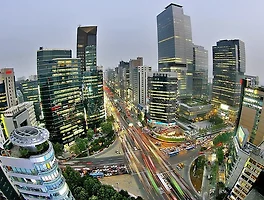이 영어 기사는 (The Korea Herald )의 기사이며 번역하는 과정에서 일분 생략하였으며 의역을 하고 있으므로 (The Korea Herald )에서 전하려는 내용과 다소 다른점이 생길수 있다는 점을 알려드립니다.
The South Korean economy has opened 2017 on a gloomy note, with the government cutting the economic growth forecast to 2.6 percent at the end of last year.
The vacancy of the state leader since President Park Geun-hye was impeached and the ensuing political uncertainties as to when the next presidential election will take place are cited by economists as the biggest risk to the economy.
On the external front, the anticipated rate hikes by the US Federal Reserve and President-elect Donald Trump’s protectionist stance are likely to weigh on Korea, which is currently suffering from a record-high household debt and falling exports.
With this in mind, The Korea Herald picked some key issues that will likely affect the overall economy in 2017.
출처:아시아나, 코리안헤럴드 |
Economic democratization
Opposition lawmakers and civic groups are likely to ride on the so-called “economic democratization” moves to put more focus on re-directing wealth, accumulated by conglomerate owners, to the general public.
The election is expected to take place sometime between April and August, depending on the Constitutional Court’s final decision on Park’s impeachment.
Experts agreed that opposition lawmakers would increasingly push more for income distribution than growth, but warned that such moves should not curb deregulation efforts to sustain long-term growth.
Joo Won, a senior economist at the Hyundai Research Institute, said a low 2 percent range growth forecast will limit the room for opposition lawmakers to excessively push for economic democratization.
출처:코리아 헤럴드 |
Corporate restructuring
기업 구조조정
Whether a new administration will be able to speed up the delayed corporate restructuring in ailing sectors will be another key issue for the Korean economy this year.
Household debt
가계 부채
With the US Federal Reserve’s rate hike in December, how to curb the growth of already-high household debt will be key to preventing a contraction in domestic demand.
The contraction in consumption was cited as the most worrisome factor for the Korean economy for 2017, BOK Governor Lee Ju-yeol recently said.
Household debt is expected to grow to 1,500 trillion won in 2017, after exceeding 1,000 trillion won in early 2014, mainly due to fiscal and monetary easing during 2014 and 2015.
가계부채는 2017년 1500조원으로 늘어날것으로 예상되는데 2014년 1000조를 넘어서면서 대부분 2014년과 2015년 재정 및 통화 완화정책을 편 결과라고 볼수 있습니다.
“It will not be easy to manage household debt for the next administration because new home buyers last year will continue to take their already-scheduled mortgage loans this year anyway,” Ted Oh, economist at NH Investment & Securities said.
“What I suggest is to find ways to slow down the growth rate of household debt and make sure property bubbles do not burst.”
Stagflation
스태그플레이션 (경기불황중에 물가가 오르는것을 말합니다.)
Stagflation, a combination of economic downturn and high inflation, is being cited as a major risk to the Korean economy, especially since prices of fresh food started to surge late last year.
According to data by Statistics Korea, prices of fresh food jumped 15 percent in November from a year earlier, continuing the rising trend from a 21 percent yearly gain in September and 15 percent in October.
2016년 11월 통계청 자료에 의하면 (대형 유통업체) 음식 가격은 15% 상승했으며 9월부터 21%상승하였습니다.
기사출처: The Korea Herald, http://www.koreaherald.com/view.php?ud=20161230000489
영어기사 이외의 글은 개인의 의견이며 투자의 판단과 책임은 본인의 몫임을 알려드립니다.
자료가 도움이 되셨다면
글아래 로그인없이 가능한
공감(하트) & 짧은 응원의 댓글 을 달아주시면
정보와 분석제공에 큰 도움이 됩니다.
감사합니다
'영어뉴스(해석)' 카테고리의 다른 글
| 2017년 세계경제가 직면한 5가지 문제 ! (영어뉴스,해석) (0) | 2017.05.23 |
|---|---|
| * 2017 대한민국 부동산 시장 부정적 * (영어뉴스) (0) | 2017.05.18 |
| [애플] 맥북 (MAC BOOK) NEW 신제품(2017) (0) | 2017.04.21 |
| 럭셔리 자동차 판매 1위는? (해외뉴스) (0) | 2017.04.19 |
| 한국 핀테크 기업들 중국 진출 눈앞! (해외뉴스) (0) | 2017.04.19 |





